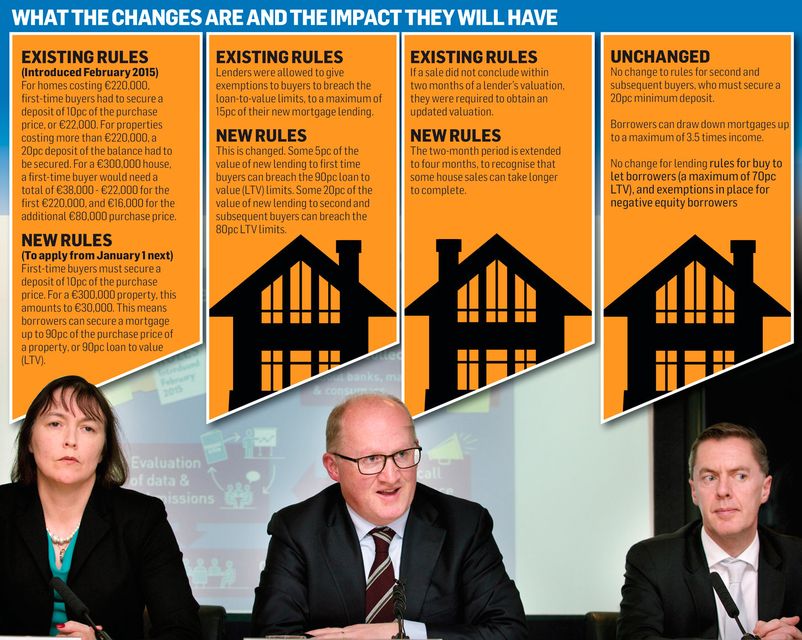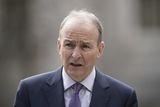All you need to know about the rule change for first-time buyers - and how it's expected to spark building surge
New buyers will end up with more money; Lane says rules were too complicated
(L to R) Cyril Roux Deputy Governor (financial regulation) Central Bank Sharon Donnery Deputy Governor Central Banking Philip R Lane Governor Cenral Bank during the announcement of the Outcome of Review of Mortgages at the Central Bank in Dublin's City Centre. Photo: Gareth Chaney Collins
The Central Bank has made a dramatic change to its mortgage lending rules, in a move that is expected to lead to a surge in home building.
However, there are also fears that the loosening of the lending limits will lead to even higher property price rises.
Click to view full size graphic
First-time buyers will now be able to borrow any amount with a deposit of 10pc, if they meet other lending criteria.
Up to now, new borrowers could have been approved for a mortgage with a deposit of 10pc for borrowings up to €220,000.
They needed a 20pc deposit for all amounts over that.
The changes will take effect from January.
At the moment, a first-time buyer purchasing a home for €300,000 needs a deposit of €38,000.
From next year, the new buyer should qualify for mortgage approval with a deposit of €30,000.
This will give the buyer an extra €8,000.
And if the buyer qualifies for the Government's Help-to-Buy scheme for new homes, they will get a tax rebate of €15,000.
This means they will be able to buy with an effective deposit of 95pc of the property's value.
However, the Central Bank also said it is restricting the exemptions to the deposit rules to just 5pc of first-time-buyer mortgages issued by banks. It was 15pc. For second-time buyers, such as movers, there will still be a 20pc deposit needed.
Read more: Plan to cap mortgage rates hurting banks, says boss of PTSB
Read more: David McWilliams: Property porn is back - and it is as big a threat as Trump or Brexit
The deposit limits do not apply to those in negative equity.
And banks will now be able to offer exemptions for up to 20pc of the value of second-time buyer mortgages. This should help some of those who bought in the boom and now want to move.
Governor Philip Lane said: "The 90pc loan-to-value ratio limit for all first-time buyers simplifies the overall framework, with only 5pc of lending permitted above this level."
The altering of the rules was welcomed by Finance Minister Michael Noonan, along with the Housing Agency, the Construction Industry Federation and estate agents.
He added that most new buyers had larger deposits than the minimums set by the rules up to now.
He insisted the rules are working well, and are needed.
"In Ireland, we know only too well the painful problems caused by reckless lending," Prof Lane said.
But the rules needed to be adjusted because they are too complicated, Prof Lane added.
He also justified the change on the basis that first-time buyers were less likely to default, according to recent data.
The Central Bank boss denied he had buckled to political pressure and fierce criticism from vested interests when altering the lending limits.
New buyers are still restricted on the amount they can borrow relative to their income, Prof Lane said.
The Central Bank said that the 3.5-times ceiling on the loan-to-income ratio remains unchanged.
The Society of Chartered Surveyors Ireland welcomed the easing of the deposit rules for first-time buyers.
Broker group PIBA said it was disappointing that non-first-time buyers do not benefit from the changes.
Fianna Fáil's finance spokesman Michael McGrath gave a cautious welcome to the changes but said his party's concern surrounds the combined effect of the changes with the Help-to-Buy scheme and how this would impact the price of new homes.
"The reality is there is a very limited supply of new homes on the market and so, first-time buyers are now in a much stronger position to come up with the level of deposit that is required."
But with such a limited stock of new homes, he said there will be intense competition among first-time buyers now for homes for sale.
Join the Irish Independent WhatsApp channel
Stay up to date with all the latest news
















